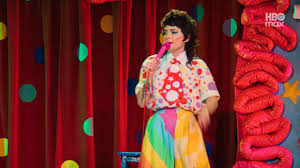Thelma the Unicorn 2024 Movie Review
An animated Netflix film about a talking pony who dreams of becoming a folk rock music star isn’t the most obvious choice for an acclaimed Grammy-winning musician looking to make her acting debut. But Brittany Howard has always marched to the beat of her own drum, both as the frontwoman of the beloved Alabama Shakes and in her heavily praised solo work. And in “Thelma the Unicorn,” she’s found an unexpectedly ideal vehicle to showcase her earthy, muscular voice, bringing enough power and soul to the part that she can make an on-paper generic kids’ movie feel fresh and inspired.
Adapted from a children’s book series by Aaron Blabey, “Thelma the Unicorn” opens with Howard’s titular mid-sized, fizzy-maned pony rocking out on stage at “Sparklepalooza” with her band the Rusty Buckets. It’s a dream, of course, as kids’ movies rarely start with their leads on top of the world. In real life, the Rusty Buckets are performing out of the old barn where Thelma and her right-hand man and BFF Otis (Will Forte) work, preparing for the big audition that might help them get a spot on the music festival lineup.
The talent from the band — and particularly from Thelma — is readily obvious to the viewer, but both the haughty show horses and the humans the farm animals work for don’t take this pack of misfits seriously. And when that big audition rolls around, a nervous Thelma is left devastated when the judges reject her before she can sing a single note, bluntly informing her that as a “forgettable farm pony,” she lacks the “right look” to be a star.
So, Thelma cosigns herself to a life of pushing carts across a field — before a convoluted accident involving a carrot and a truck carrying buckets of pink paint and glitter causes her to resemble a unicorn come to life. Instantaneously, her problem of blending in with the crowd goes away, and she gains swarms of admirers by performing a pop-rock ballad that goes viral online.
The news of a singing, shiny unicorn catches the attention of a salt-of-the-earth rock music producer Peggy (Maliaka Mitchell), who offers the Rusty Buckets a recording project. It also captures the attention of slimy talent agent Vic Diamond (Jemaine Clement), who swoops in to transform Thelma into a solo act, making her a world-beloved superstar practically overnight. In exchange, Thelma loses her friendship with her band and grows increasingly uneasy about how these screaming hordes at her concerts don’t see the real her.
“Be yourself” and “authenticity is important” are not messages that will shock any parents who watch alongside their children; everything from “Aladdin” to “Shrek” has already covered this territory pretty thoroughly before. “Thelma the Unicorn” doesn’t do a ton to shake up your expectations for anything that will happen, and its greatest weakness is how rigidly formulaic its journey often feels. And yet, the film — directed by Jared Hess and Lynn Wang — still manages to often delight, thanks to the comedy and charm packed into its dusty bones.
Hess wrote the film with his wife Jerusha, and if the duo sounds familiar, it’s because they’re responsible for the 2004 cult classic “Napoleon Dynamite.” You can feel the DNA of that coming-of-age comedy all over the film, even beyond its lead Jon Heder’s presence voicing llama Reggie in Thelma’s band. The animation style (courtesy o French company Mikros) renders the animals in a fairly generic cutesy style, and the environments are similarly uninspired, but the humans have an appealing, rubbery grossness that feels apiece with the pimply teenagers of “Napoleon Dynamite”; Vic, with his comically large fake teeth and hairy face, sticks out as a particularly repulsive creation, in a good way.
The script is amusingly silly, filling out its world where humans and animals converse regularly and a narwal is the world’s biggest pop star with puns that include subbing Instagram for “Pigstagram.” The jokes come at a frequent enough speed and with a successful enough hit rate that the film mostly avoids getting bogged down by the easy-to-predict story beats, and it’s particularly successful when it casts a mildly satirical look at the music industry. Under Vic’s contract, Thelma releases her music under “Huge Sellout Records” and gets her authentic root-inspired rock music subbed out for generic pop-rap generated by a literal algorithm.
Yes, it’s a little weird to see jokes about algorithms coming from a Netflix original, but “Thelma the Unicorn” presents its bleak vision of the predatory music industry and the plight of the modern celebrity as an outsized cartoon, with just enough bite to feel relevant; a throwaway gag about a screaming Thelma the Unicorn stan presenting her with adoption papers that will legally make him her son says more about modern celebrity culture in 20 seconds than HBO’s “The Idol” managed in six episodes. Elsewhere, Thelma ascends to the top in part through a fake publicity relationship with a TikTok famous (well, VideoTubeTube famous) horse Danny Stallion (Fred Armisen), who’s known for his surfer boy affect and gross out videos of chewing cud. In reality, he’s a smart kid studying to become a brain surgeon, but as he cheerfully explains to Thelma, he’s “gotta pay for med school” somehow.
Armisen is perfectly cast in the role, and he’s just one voice in an ensemble so stacked that a ringer like Kristen Shaal can be relegated to a one-scene cameo. Forte is wonderfully sweet as the nerdy Otis, while Heder is hilarious as the spacey Reggie. Clement is snarling and campy as the vicious Vic, and “Righteous Gemstones” star Edi Patterson brings her memorably bratty line deliveries to a put-upon and vindictive talent agent attempting to sabotage Thelma’s meteoric rise to fame. Even Zach Galifianakis shows up, in a tiny role that still gets great mileage out of his singular comedic timing.
Everyone in the cast still pales compared to Howard, and the opportunity to hear her sing is likely the main attraction for any adult who would choose to watch. There’s no clear breakout of the original roots-inflected pop rock songs featured in the film (the music is credited to Dreamworks vet John Powell), but Howard is so lovely performing them that it doesn’t matter. Her rich, powerful voice makes every note hit with incredible force, and supplies emotion that makes the pivotal turning points in the film far more powerful than the script can manage.
Even outside of the musical numbers, Howard is terrific, enough that it’s a surprise to learn that this is her first time doing any type of acting, much less voice acting. She’s wonderfully down-to-Earth as the determined but insecure Thelma, with an earnestness that completely sells the scripts heavily broadcasted morals. If the rest of the film does err towards the slightly generic, Howard gives “Thelma the Unicorn” a great lead that you’ll have no trouble rooting for.




